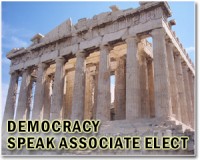| . |  |
. |
Canberra, Australia (UPI) Jul 19, 2010 Immigration will be a major issue as Australians head to the polls next month after the country's first woman prime minister called a snap election. Labor Party leader Julia Gillard, who wrestled the position of prime minister from Kevin Rudd only last month, said she was aware of being unelected to the job and was going to give Australians their right to vote for who leads their country. Gillard is seeking that mandate on Aug. 21 and wants to build her own power base after Rudd guided Labor to a landslide victory in 2007. She faces Liberal Party leader Tony Abbott in what is expected to be a close battle between the two British-born Australians. Abbott, 52, was born in London to Australian parents. It will be the first election for the Rhodes scholar, journalist and former concrete plant manager since he took over leadership of the Liberals in December. Gillard, 48, was born in Barry, Wales, and moved to Australia with her parents when she was 4. She qualified as a lawyer, later becoming chief of staff to a Labor member of Parliament before winning a seat herself in 1998 and holding several ministerial post, including deputy prime minister under Rudd, 52. But Rudd, who had topped opinion polls at the beginning of the year, had become a liability to the party. His managerial style was increasingly labeled aloof and weak and his popularity plummeted when he backed off setting up an anti-pollution carbon emissions trading scheme. Within a week in June, Gillard and her backers had organized an internal coup, with Rudd agreeing to step down in her favor. In her televised speech announcing the election, Gillard said she was seeking voters' "trust" and Australia should be "moving forward" with Labor and not looking back under Abbott and the Liberals. Her priorities are maintaining a strong economy, reforming education and assuring voters "you don't have to be afraid of the future," an oblique reference to the immigration problem that successive governments has faced in the past decade. Both Gillard and Abbott favor beefing up the country's border protection agencies to stem the increasing flow of boat people asylum seekers and refugees off the northern coast. Australia's maritime authorities rescued another 84 asylum seekers from a sinking ship last week, adding to the more than 3,000 who have arrived this year alone. Many pay large sums to notorious people traffickers in their native lands or Indonesia to get them passage on dangerously crowded and unseaworthy boats. Abbott's solution is to send the rickety boats and their human cargo -- mostly from Sri Lanka and Afghanistan -- back to where they came from, rather than added people to the overcrowded refugee processing center on Australia's Indian Ocean territory of Christmas Island. There is also growing concern among voters about the government's tactic started last month of shipping some refugees to small purpose-built holding centers in isolated towns and communities on the mainland until their status is processed. Gillard appeared wrong-footed in the national media last week after it became known she had informal talks with the president of Timor-Leste about setting up a temporary refugee processing center in that country, one half of the island of New Guinea. She was hesitant to admit to it but Timor-Leste President Jose Ramos-Horta wasn't. Ramos-Horta cautiously said he would listen to any formal proposal but the country's parliament voted unanimously against such a center, even if run by a third part such as the United Nations. In an off-hand remark last week, Australia's Immigration Minister Chris Evans said the immigration debate is "killing" the government and he takes full responsibility for the "toxic" discussions in all media. He reportedly said that controlling the debate on immigration is one of his greatest failings as minister and too often the media, including Twitter comments, were overly aggressive in their debates. Evans said discussions were toxic because they were hardening people's attitudes. He had allowed misinformation to get out, had allowed radio shock-jocks to control the debate and not have it based on hard fact and information. An example is linking immigration to population growth and sustainability in Australia. This was irrational because there are very few boat people in relation to the overall population, Evans reportedly said.
Share This Article With Planet Earth
Related Links Democracy in the 21st century at TerraDaily.com
 Electronic voting no threat yet to the old style ballot box
Electronic voting no threat yet to the old style ballot boxHong Kong (AFP) July 12, 2010 They held elections within days of each other: The Philippines, a lively democracy where politicians get shot dead in the street and Britain, the rock solid 'mother of all parliaments'. But the Asian state's quick-fire digital vote made the European nation look more like a grandmother as its citizens stuck to the old style of dropping bits of paper in battered old boxes. It was hoped el ... read more |
|
| The content herein, unless otherwise known to be public domain, are Copyright 1995-2010 - SpaceDaily. AFP and UPI Wire Stories are copyright Agence France-Presse and United Press International. ESA Portal Reports are copyright European Space Agency. All NASA sourced material is public domain. Additional copyrights may apply in whole or part to other bona fide parties. Advertising does not imply endorsement,agreement or approval of any opinions, statements or information provided by SpaceDaily on any Web page published or hosted by SpaceDaily. Privacy Statement |